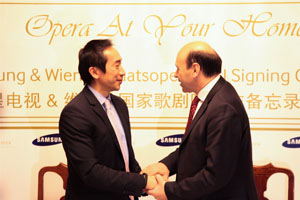An entity of identity
Updated: 2013-12-12 10:28
By Wang Kaihao (China Daily)
|
||||||||
 |
|
Students at Hohhot's Manchu Elementary School wear traditional Manchu costumes and performance Taipinggu, a dance with hand-held drums. |
"We plan to unite every personal effect we can find to categorize, save and study Manchu culture," says Yu Hao, secretary-general of the association. According to him, Manchu wedding rituals and taipinggu, or "drum of peace", a dance variety with hand-held drum, were added to Inner Mongolia's intangible cultural heritage list in 2011. Though the list is likely to include more Manchu-related items, he is not optimistic about the future.
He explains many Manchu people had to change their names and hid their identities for decades after the revolution in 1911 toppled the Qing Dynasty and diminished many old customs.
According to the national demographic census in 2010, China has more than 10 million Manchu people, but Yu says most have adopted the Han's lifestyle.
Perhaps the most pitiful consequence is the vast majority of Manchu people can no longer speak their mother tongue. There are Manchu - language classes in China's northeastern provinces like Heilongjiang. Yu's association has introduced the language class to Hohhot Manchu Elementary School. Founded in 1957, some 800 of the school's 2,000-odd current students are of Manchu descent.
"Whether we will be successful in preserving the ethnic culture will depend on our generation," says Huang Yuhong, principal of the school. The language class is now conducted once a week as an extracurricular activity, but Huang says the plan is to include it as part of the school's curriculum in future.
"We've endeavored to open many classes promoting intangible cultural heritage to our kids. With such a large Manchu population, it will be embarrassing if the traditions fade away."

 Post-baby Duchess
Post-baby Duchess
 Victoria Beckham S/S 2014 presented during NYFW
Victoria Beckham S/S 2014 presented during NYFW
 'Despicable' minions upset Depp's 'Lone Ranger' at box office
'Despicable' minions upset Depp's 'Lone Ranger' at box office
 'Taken 2' grabs movie box office crown
'Taken 2' grabs movie box office crown
 Rihanna's 'Diamonds' tops UK pop chart
Rihanna's 'Diamonds' tops UK pop chart
 Fans get look at vintage Rolling Stones
Fans get look at vintage Rolling Stones
 Celebrities attend Power of Women event
Celebrities attend Power of Women event
 Ang Lee breaks 'every rule' to make unlikely new Life of Pi film
Ang Lee breaks 'every rule' to make unlikely new Life of Pi film
Most Viewed
Editor's Picks

|

|

|

|

|

|
Today's Top News
China safeguarded national interests in 2013
14 terrorists killed in Xinjiang
 Chinese law firm expands in US
Chinese law firm expands in US
Complacency hinders US energy-saving strategies
China plans its Chang'e-5 lunar probe
Dialogue urged after naval incident
Chang'e-3 mission 'complete success'
Cave art's wide influence explored
US Weekly

|

|







